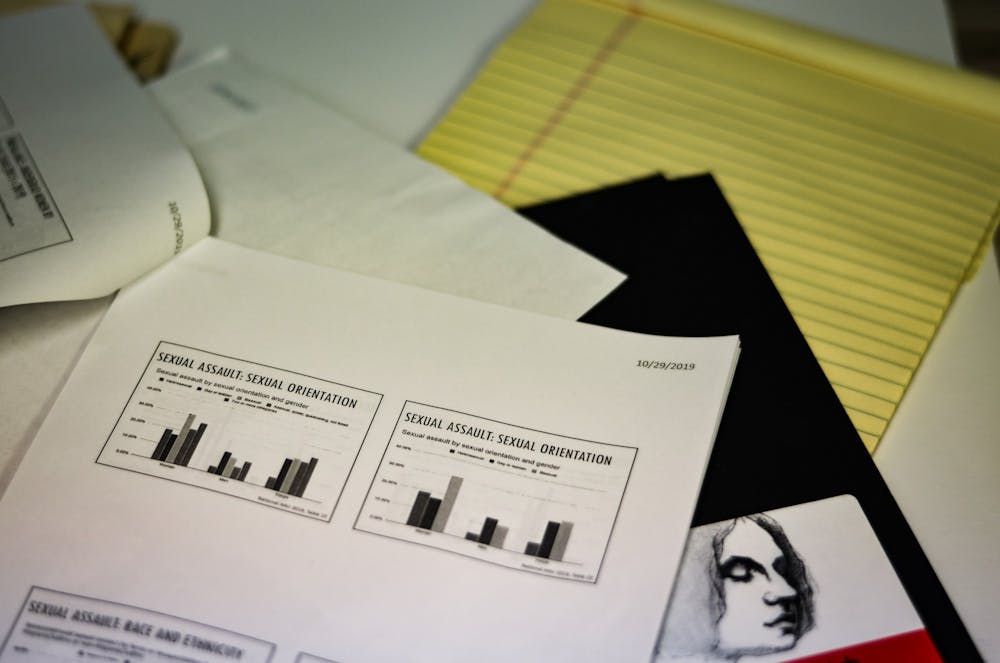
At an open forum Tuesday evening, students discussed and expressed their frustration with the results from the most recent Association of American Universities Campus Climate survey.
Credit: Sophia DaiStudents criticized Penn at an open forum Tuesday on the results of the recent Association of American Universities Campus Climate Survey on Sexual Assault and Sexual Misconduct, which demonstrated no significant change from the results of the 2015 survey.
Administrators at the forum, including Penn Violence Prevention Program Coordinator Katie Chockley, explained statistics from the survey and students in small groups discussed peer support and fraternity sexual violence. The event was held at the LGBT Center.
The 2019 AAU survey results found that at Penn, 25.9% of undergraduate women reported experiencing some form of unwanted sexual contact since coming to college, a 1.3% decrease from 2015.
The percentage of transgender, non-binary, and genderqueer undergraduate students who reported experiencing unwanted sexual contact since entering college also rose to 21.5%, up from the 19% reported in 2015.
Chockley began the forum by presenting data from the AAU survey. One piece of data is that the second-highest reason that students did not report sexual assault was that they felt it was not serious enough to contact a program or resource.
“The survey touched on so many different things that we have to address and it’s hard to have one conversation," said one meeting attendee, who introduced themselves as a graduate student. "I think that one conversation is: How do we address students not saying that they do not know where to go? And another conversation is how to stop sexual assault and violence; how can faculty, staff, [teaching fellows] help undergrads?"
While some attendees expressed anger, others noted more complicated feelings they had in reaction to the data.
“The freakout [over the survey] shields some of the real work we can actually see since the 2015 Campus Climate Survey came out in terms of bystander intervention, in terms of reasons why folks weren’t reporting in 2015, versus what it looks like now,” said another attendee, who was wearing a Division of Public Safety jacket.
While Chockley acknowledged the increase in awareness and understanding of resources regarding assault, she also noted that Penn lags behind its peer institutions "in a distinct way."
After the presentation of the data, attendees broke out into five groups to discuss specific aspects of sexual assault on campus. Some groups talked about ways dorms can be a setting for education and violence, while others discussed fraternity violence and programs to provide sexual assault education.
During their small-group presentation, one attendee said that the existence of fraternities allows for sexual violence.

The open forum was held at the LGBT Center, which was one of the groups that sponsored the forum, along with Penn Women's Center, the Undergraduate Assembly, the Penn Association for Gender Equity, and the Lambda Alliance.
The event was sponsored by multiple organizations including the LGBT Center, Penn Women’s Center, the Undergraduate Assembly, the Penn Association for Gender Equity, and the Lambda Alliance.
Chockley said the goal of the forum was to highlight student voices in light of the survey results. Chockley, along with LGBT Center Director Erin Cross, spoke of the importance of providing students a space on campus to have their voices heard about this sensitive topic.
“We wanted to make sure that a forum was created for a more diverse audience [because] all of these issues affect everybody on campus, so we just wanted to make sure there was a student forum where all student voices would be heard,” Cross said.
Chockley said most of the discussion surrounding the AAU survey is centered on a select number of "top-line" statistics. She spent a large portion of the forum comprehensively explaining the data from the survey.
“My hope is that students go into their advocacy work around these issues better informed and better able to use this data and use this information we have from AAU and having targeted smart activism,” Chockley said.
Students who attended the event said while this forum did not solve the issues reflected in the survey data, it did provide a space where they could honestly and constructively continue a very important conversation about sexual assault on campus.
As PAGE chair, College senior Tanya Jain said she is fortunate to be able to meet with administrators, but the ability to raise critical questions should be extended to all students.
“We have had a lot of conversations with administrators, but I think talking to students who don’t get a seat in those meetings is really important,” Jain said.
The Daily Pennsylvanian is an independent, student-run newspaper. Please consider making a donation to support the coverage that shapes the University. Your generosity ensures a future of strong journalism at Penn.
Donate






